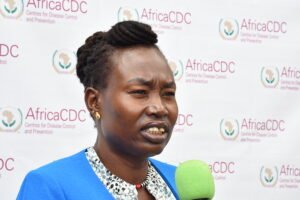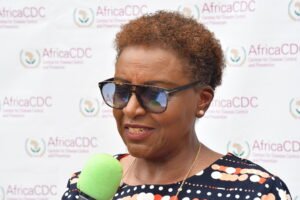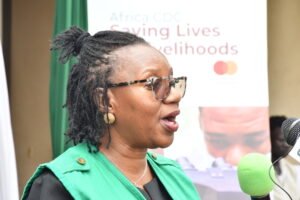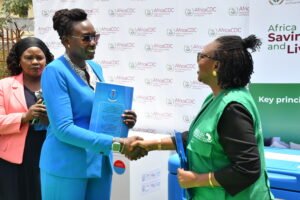By: Madrama James
King News, 04th Oct Juba. The Ministry of Health marked a significant milestone today with the official handover of advanced cold chain equipment to strengthen South Sudan’s vaccine distribution network.
The ceremony, held at the Ministry’s headquarters, was attended by the Minister of Health, Yolanda Awel Deng, Health partners, and key stakeholders in the healthcare sector.
The newly acquired 65 cold chain equipment, which includes main freezers, solar panels, and temperature monitoring devices, is expected to significantly enhance the country’s capacity to store and distribute vaccines, particularly in remote and underserved areas.
This initiative is part of the government’s commitment to improve health infrastructure and ensure vaccine accessibility for all citizens.
During the handover, Yolanda Awel Deng said the cold chain will strengthen her Ministry’s capacity to store and transport vaccines under optimal conditions across the country.

The Minister of Health, Yolanda Awel Deng (Photo Credit: Madrama James, King News)
“These resources that we have received will strengthen our capacity to store and transport vaccines under optimal conditions. And it is a very good thing that we heard testimony from the head of UNICEF in the country that she went to one of the remotest places in South Sudan and she found that we have got very good quality vaccines available. That shows that the taxpayers’ money of whoever is giving her that money. The government of South Sudan is not misused. It goes where it’s supposed to be. And I will make sure under my leadership that no funding that is given to us is going to be mismanaged. Because we are going to follow a transparent and a system that is testable, like what we have seen in the last few years.”
The handover was made possible through a collaborative effort between the South Sudan government, regional and international health organizations, including Africa Centers for Disease Control and prevention (CDC) and United Nations Children’s Funds (UNICEF).
These partners have contributed not only financial support but also technical expertise to assist in the implementation and maintenance of the cold chain systems across the country.
In her remark, Hamida Lasseko, a UNICEF representative, expressed commitment while in partnership for improved Health outcomes and quality immunization service delivery in South Sudan.

Hamida Lasseko, a UNICEF Representative, expressing commitment during the handover ceremony for improved Health outcome (Photo Credit: Madrama James, King News)
“UNICEF continue to remain and be your partner in all what we do, but very much joining hands with Africa CDC because the government of South Sudan is taking vaccination program very seriously despite of all challenges that we have in terms of weather as we are having floods in terms of access in some areas, but we know our goal is to end up with an outcome of quality immunization service delivery. So, we continue to recommit and commit of that from UNICEF and we will be with you all the time.”
Lasseko of reported that the equipment installation is nearing completion, with a current progress rate at 97% expected to be fully installed soon.
According to the document obtained by King-News, South Sudan has received 65 pieces of cold chain equipment, including main freezers and solar direct drive, valued at US$573,784.14.
Meanwhile, Dr. Mazyanga Lucy Mazaba, Africa CDC Representative, expressed the importance of a robust cold chain system in safeguarding the potency of vaccines, especially in the light of global health challenges such as the ongoing M-POX outbreak.

Dr. Mazyanga Lucy Mazaba, Regional Director for the African CDC for Eastern Africa Regional Coordinating Centre. (Photo Credit: Madrama James, King News)
“This investment will enable the Ministry of Health to expand its immunization schedule by introducing additional antigens. These efforts are crucial to strengthening South Sudan’s preparedness and response to the ongoing M-POX outbreak. And now we are talking about Mar-beg coming into place. While we don’t have the vaccines yet, but it’s something that is work in progress. By enhancing immunization coverage, we can ensure that every child and eligible adult in South Sudan has access to life-saving vaccines, protecting them from vaccine-preventable diseases and contributing to a healthier, more resilient nation.”
In her closing remark, the Health Minister urged the public to take the immunization schedule of their family members seriously to prevent vaccine-preventable diseases.

The Minister of Health, Yolanda Awel Deng, and Dr. Mazyanga Lucy Mazaba, Regional Director for the African CDC for Eastern Africa Regional Coordinating Centre, shook hands while exchanging documents. (Photo Credit: Madrama James, King News)
“Beginning of investment in a child or a human being is from when they are little. If we have got this strong investment, that means that we are going to have got a healthier population. A healthier population leads to a very healthier human capital. A healthier human capital leads to long life expectancy, which leads to a nation’s economic growth. So, it is important to look that what we are receiving here is going to be a very long chain of productivity in our country. I appeal to the public. to take immunization of your family members seriously, seeing it is safeguarded against diseases, especially during this flood season.”
The handover ceremony concluded with a signed document, which attendees witnessed. The cold chain system will soon be operational in health facilities across the nation.
As South Sudan continues to enhance its public health infrastructure in pursuit of health outcomes, the introduction of this cold chain equipment is a vital step in ensuring that vaccine programs operate efficiently and effectively.



